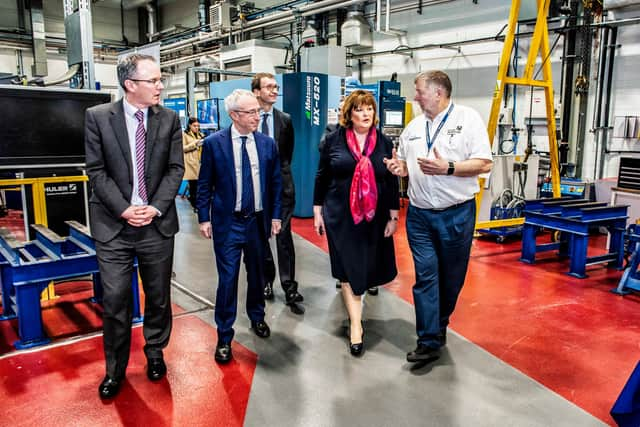Sheffield manufacturing guru sets out vision to boost 'forging and forming'
and live on Freeview channel 276
Keith Ridgway CBE is a co-founder and former executive dean of the Advanced Manufacturing Research Centre, at Sheffield University.
Following his retirement two years ago, he moved to the University of Strathclyde where he is executive chair of the Advanced Forming Research Centre - a globally leading centre for forging and forming.
Forging a new future in Sheffield


Advertisement
Hide AdAdvertisement
Hide AdIt is 20 years next month since the Advanced Manufacturing Research Centre was formed.
Little did we know then what a phenomenal success it would be, or that it would become the model for a network of seven High Value Manufacturing Catapults spread across the country, from the National Composites Centre in Bristol to the University of Strathclyde’s Advanced Forming Research Centre (AFRC) in Renfrewshire next to Glasgow.
In the coming months an outpost of the AFRC will be established in a small office on the Olympic Legacy Park in Sheffield, bringing a third HVM Catapult to the region. It will give companies in this part of the world access to world-leading research talent and some of the most advanced forging equipment in the world.
Indeed, in the next few months, the AFRC will commission the FutureForge, a £20m investment supported by the Scottish government and the Aerospace Technology Institute. This is the most advanced forge in any research organisation in the world and a national research asset. It consolidates the AFRC’s position as a world-leading research centre.
Advertisement
Hide AdAdvertisement
Hide AdSo why is the AFRC setting up a base in Sheffield? Two reasons really. First, because South Yorkshire is arguably the centre of metal forging and forming in the UK. The West Midlands is also a major centre for forging and forming and may take issue with that statement, but we are starting where the most prominent companies with a broad range of facilities are based. Other offices can be established elsewhere over time if there is the demand.
Many will be household names to the readers of The Star: Forgemasters, Forge Solutions, Chesterfield Cylinders, Doncasters, Independent Forgings and Alloys, Abbey Forged Products, Bodycote, Special Steel Group, and Tinsley Bridge are all within a few miles of each other. Most of these companies will claim leadership in their particular area of expertise and offer us a significant technical challenge.
Smaller companies such Chapmans Agricultural and Footprint Tools are producing quality components for specific sectors. Many are looking to increase productivity, automate and reduce their carbon footprint by cutting waste and energy use.
Second, it is essential to recognise that alongside the most advanced forging equipment in the world, are some of the most talented forging researchers in the world.
Advertisement
Hide AdAdvertisement
Hide AdWhat we have in Glasgow predominately supports the aerospace and oil and gas industries, which is a big part of our economy. But the AFRC is a national asset and we also need to support companies in places like Sheffield where the focus may be on hand tools, cutlery, medical or agricultural parts. Sheffield offers the opportunity to develop a wider research agenda, industry-based, and plugging into existing expertise and capability.
When we started the AMRC 20 years ago, it was a new model; we had ‘state of the art’ equipment and offered a new way of working with industry. Most of the High-Value Manufacturing Catapult adopted this model. As a result of our success, over the years, we have advised cities and countries worldwide about the social and environmental benefits of supporting industrially focused research.
But time moves on, times are tight, governments can't afford to continue to invest in large items of capital equipment. Based on what we’ve learnt by working with the forging sector over the past decade, we are setting up new ways of working, becoming a fleet of foot organisation that takes the research lab to the company rather than forcing the company to the lab. This will make the AFRC more relevant to companies in Sheffield. If there is a problem manufacturing a part on a drop stamp, we can plug into modelling and simulation facilities in Glasgow but carry out testing on the shop floor in South Yorkshire.
Ironically, the pandemic has created something of a sea change in attitudes to remote working and creates a new kind of connectivity between existing Catapult networks. Access to this R&D expertise will either be paid for, or part of a contribution to the project's cost, thus reducing the cost of engaging in R&D and making it more accessible to companies in the Sheffield City Region.
Advertisement
Hide AdAdvertisement
Hide AdWe are grateful for the help of Sheffield City Council, who have been very supportive and found us accommodation with David Slater on the Olympic Legacy Park. This will be a simple office area showcasing the work we are doing rather than an iconic building and significant investments in machinery.
So what are the next steps? Once we are entirely in place next month, we will recruit business development staff who will introduce the AFRC to local companies. We will establish a Forging and Forming Forum that will be free to join and help us to focus on the real problems facing companies in this region. Through the Forum, we will introduce webinars and case studies to help companies make the most of the relationship.
If Covid has taught us anything, it is that we can work remotely. We don't need facilities in Sheffield; we need a good internet connection to a host of services. These include process improvement, tool and die design, manufacture and refurbishment, quality improvement, materials analysis, residual stress analysis, modelling and simulation, and help reducing energy use and carbon footprint.
We are excited to be bringing the AFRC to Sheffield – the home of steel - and being a part of the industrial community.